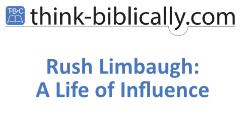
The phrase “Christian Nationalism” is being bandied about by the American political left and is defined as a belief focused on “legislating civil and criminal laws that reflect a view of Christianity and the role of religion in political and social life.[1]” The reason they talk about it so much is they see Christians as the last obstacle to overcome in their desire to legislate their anti-Chrtian civil and criminal laws. To most Christians the idea of Christian Nationalism doesn’t sound like a bad thing, but I’d like to suggest that it’s too limiting in that it could be understood as a strictly New Testament approach to politics.

Tomorrow is assured no one, yet when yesterday is already ours what more can mortal man ask?

A phrase has been made increasingly popular through commercials and celebrity usage: “you do you” sounds liberating -- who wouldn’t want to do what they want to? Most people want to live life on their own terms. I challenge you to think a little deeper, however. The Bible says there is nothing new in this world (Ecclesiastes 1.9) so we should expect that this philosophy has been tried before. What were the results? The Bible has something to say about that too.

After decades of political bodies all around the world telling us that skin color doesn’t matter – “we’re the same on the inside” they told us – suddenly they’re messaging has changed and today skin color is the only thing that matters. The group Black Lives Matter is offended when you remind them that all lives matter, and the US congress kneeled in their support of BLM. Many metropolises are offering relief funds to citizens – but only to non-white citizens and the federal government has talked about reparations to black families whose ancestors were slaves in America over 180 years ago.

Yesterday a person with warped and murderous beliefs assassinated conservative influencer Charlie Kirk at a live event being held at the Utah Valley University campus in front of thousands of people. No matter what side of the political aisle you may be on, murder of an individual over political beliefs should never be acceptable. Yet within a few hours of his death, I was witnessing celebration and cheering from liberal leaning individuals. And they were not a small minority either. One person posted, “Well, guess he lost the debate”. The post received 120,000 likes in only a couple hours.

On evening I was thinking about what God has done, and that he will do, that don’t align with my idea of logic. In the past I’ve brushed this off thinking, we are not given all the facts or details of the story, so sometimes we are not going to understand every little thing. But then another thought struck me, and I don’t know where it came from because it is so foreign to the way I normally think, but I wondered if God’s actions weren’t always based on logic. Maybe, sometimes, they were based on something else.

John 12 and Mark 14 tell of an awkward moment at an intimate dinner party. The dinner takes place at the home of Lazarus (following his raising from the dead) and his sisters Mary and Martha. After dinner, Mary begins to anoint Jesus’ head and feet with an expensive oil made of nard. Judas objects to this compassionate display, arguing that the oil should have been sold and the money given to the poor. Jesus rebukes this notion, stating Mary has chosen the greater good. There is a lot to unpack in this short scene.

The Chosen is a highly polished dramatization of the Gospel story told in a modern television style complete with episodes and seasons. The most direct comparison would be the network television miniseries A.D. The Bible Continues, produced by Roma Downey and Mark Burnett. In comparison, The Chosen is a better series; the quality of the acting is superior, and the scene direction and production mechanics appear to be of a higher quality. If The Chosen had ended up with even half as many viewers it would be a success, but at over 50 million views as of August 2020, it has already vastly exceeded the network television show’s numbers (13.1 million).

It is a favorite past time of Bible professors to explain the views of salvation for both Calvinism and Armenianism to students, and then set them loose to argue which has more merit. The truth is, both systems are problematic on certain points. While both come to a logical conclusion based on their starting points, the basis for their arguments are in error which invalidates some of their conclusions. Here’s how salvation works.

During the Covid-19 “crises” Christians became used to attending church online. In fact, one good thing to come out of the pandemic is that many churches upgraded their technology. Live streaming is now more common, and even small churches are finding that streaming live on Facebook is an affordable option. This is good news for elderly and disabled believers as well as “seekers” (those who are non-religious but interested in learning more about Christianity). That said, attending church virtually isn’t healthy for those who can attend in person. It’s time to go back to church. Here’s why.

Before I get on a roll, I believe it is important from the start to recognize that a great many pastors have suffered over the last year. I may be critical of some below, so I recognize here and now that many good pastors are left hurting in the wake of government overreach when responding to a virus with a 98% survivability rate. When one is put in the position of being unable to practice one’s calling or risk the government fining – or imprisoning you (as they did regularly in Canada) for doing so – stress and uncertainty take up position over each shoulder. For you, we pray for relief.

Tomorrow is assured no one, yet when yesterday is already ours what more can mortal man ask?
